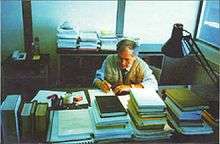Masatoshi Gündüz Ikeda
Masatoşi Gündüz İkeda (Japanese: 池田 正敏 ギュンドゥズ Ikeda Masatoshi Gyunduzu) (25 February 1926 – 9 February 2003), was a Turkish mathematician of Japanese ancestry, known for his contributions to the field of algebraic number theory.[2]
Masatoshi Gündüz Ikeda | |
|---|---|
 | |
| Born | February 25, 1926 |
| Died | February 9, 2003 (aged 76) |
| Nationality | |
| Alma mater | Osaka University |
| Awards | Mustafa Parlar Foundation Science Prize (1993)[1] |
| Scientific career | |
| Fields | Algebra |
Early years
He was born on 25 February 1926 in Tokyo, Japan to Junzo Ikeda, head of the Statistics Department of an insurance company, and his wife Yaeko Ikeda. He was the youngest of a brother and two sisters. He grew up reading mathematics books belonged to his father. During his school time, he bought himself used books about mathematics and the life story of mathematicians. He was very much impressed by the French mathematician Évariste Galois (1811–1832).[3]
Academic career
He graduated from Mathematics Department of Osaka University in 1948. Ikeda received a Ph.D. degree with his thesis "On Absolutely Segregated Algebras" in 1953, and was appointed associate professor in 1955. He pursued scientific research at University of Hamburg in Germany under supervision of Helmut Hasse (1898–1979) between 1957-1959. Upon a suggestion of Hasse, he went to Turkey in 1960 and landed at Ege University in İzmir. In 1961, he was appointed foreigner specialist in the Faculty of Science at the same university.[3][4][5]
In 1964, Ikeda married to Turkish biochemist Emel Ardor, whom he met during his time in Hamburg and followed to Turkey. He was naturalized and adopted the Turkish name Gündüz. He became associate professor in 1965 and full professor in 1966. With permission of the university, he went 1968 to the Middle East Technical University (METU) in Ankara as visiting professor for one year. However, following the end of his term, he was offered a permanent post as full professor, which he accepted upon the proposal of the mathematician Cahit Arf, whom he knew since his early years in Turkey.[3][5]
From time to time, he was invited as visiting professor to various universities such as University of Hamburg (1966), San Diego State University, California, USA (1971) and Yarmouk University in Irbid, Jordan (1984, 1985–86). In 1976, Ikeda carried out research work at Princeton University, USA. In 1976, Ikeda went to Hacettepe University in Ankara, where he chaired the Mathematics Departments until 1978, before he returned to METU. He retired in 1992 at METU. His long year scientific devotion was in Galois theory.[3][5]
Among the research institutions he served were TÜBİTAK Marmara Research Center and Turkish National Research Institute of Electronics and Cryptology. Finally, he worked at the Feza Gürsey Basic Sciences Research Center in Istanbul.[4]
He was member of the Basic Sciences Board at the Scientific and Technological Research Council of Turkey (TÜBİTAK), and served as the head of the Mathematic Research Unit at the METU.
Family life and death
He died on February 9, 2003 in Ankara. Following the religious funeral service held on February 12 at Kocatepe Mosque, he was laid to rest at the Karşıyaka Cemetery.[4] He was father of two sons.[3]
Recognition
In 1979, he was honored with the TÜBİTAK Science Award.
The Mathematics Foundation of Turkey established the "Masatoshi Gündüz İkeda Research Award" for his memorial.[6]
References
- https://web.archive.org/web/20110927224106/http://www.math.metu.edu.tr/ikeda/m1.html. Archived from the original on September 27, 2011. Retrieved December 4, 2011. Missing or empty
|title=(help) - O'Connor, John J.; Robertson, Edmund F., "Masatoshi Gündüz Ikeda", MacTutor History of Mathematics archive, University of St Andrews.
- "Uzakdoğulu Bir Matematikçi-Gündüz İkeda" (PDF) (in Turkish). Biltek. Archived from the original (PDF) on 2012-06-28. Retrieved 2013-10-21.
- "Prof. Dr. Gündüz İkeda vefat etti". Hürriyet (in Turkish). 2003-02-10. Retrieved 2013-10-21.
- Oğhan, Şehriban (2003-02-13). "Japon doğdu, Türk öldü". Hürriyet (in Turkish). Retrieved 2013-10-21.
- "Masatoshi Gündüz İkeda Research Award (2013)". Mathematics Foundation of Turkey. Archived from the original on 2013-10-21. Retrieved 2013-10-21.